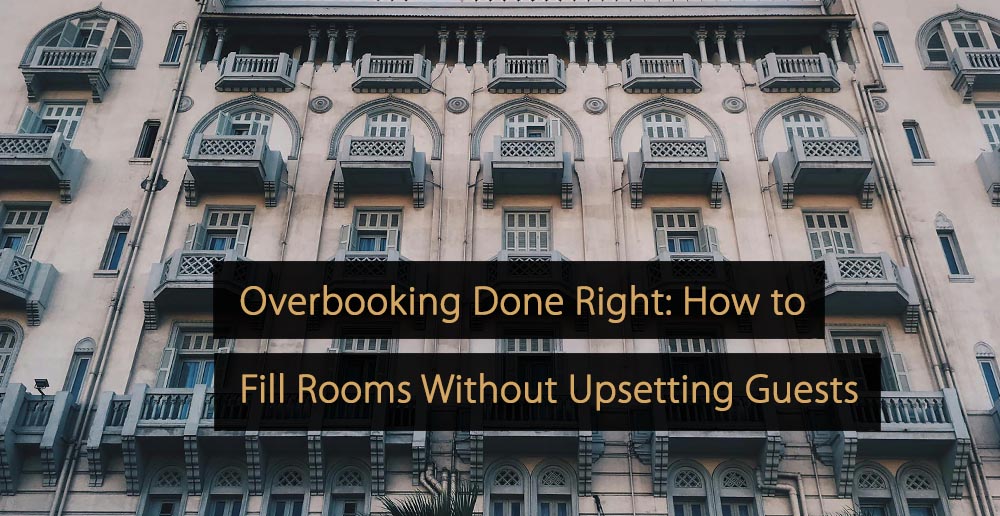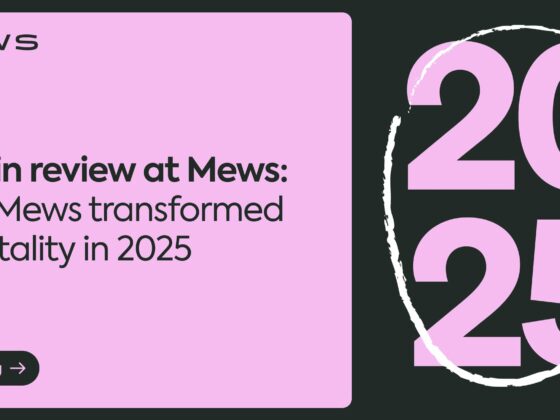
Imagine you’re at the front desk, midway through a busy day, when you suddenly realize you’re overbooked. Guests are still pouring in, but you know—awkward conversations and unhappy faces await you. But overbooking doesn’t have to be chaotic. When done strategically, it can increase occupancy and revenue. This article will show you how to master overbooking and turn a stressful scenario into a smooth process.
What Does Overbooking in Hotels Look Like?
Overbooking can feel like a ticking time bomb, but when done right, it’s a well-calculated strategy that benefits both the hotel and its guests (yes! Even guests).
Rather than rushing around in a panic, imagine confidently handling the situation—because your team is trained, prepared, and equipped to treat overbooking as just another day at the office.
Why Hotels Use Overbooking
Overbooking is a common revenue strategy in which hotels accept more bookings than rooms available, anticipating that some guests will cancel or not show up. This keeps occupancy rates high but comes with the risk of relocating guests—something no one enjoys!
- Why it’s important: Empty rooms, especially last-minute vacancies, hurt profitability. Overbooking helps fill those gaps and maximize earnings.
- How it helps: With a smart overbooking strategy, hotels can reduce the impact of no-shows and cancellations, filling rooms that would otherwise remain vacant.
The Good and Bad of Overbooking Strategy
While overbooking can increase revenue, it can also lead to guest relocations or “walking,” where guests are moved to another hotel when there aren’t enough rooms.
- The good of overbooking:
- Maximizes occupancy
- Improves revenue per available room (RevPAR)
- Offsets last-minute cancellations or no-shows
- The bad of overbooking:
- Often upset guests who have to be relocated
- Negative reviews and damage to your hotel’s reputation
- Additional costs for covering guest accommodation at another property
Overbooking Strategy: How to Do It Right
To take advantage of overbooking while minimizing risks, you can introduce the following best practices:
- Set clear overbooking limits: Establish a safe threshold for how many rooms to overbook, such as a percentage of total inventory. For instance, a hotel with 100 rooms might set a 5-10% overbooking limit, adjusting as the arrival date approaches. If you manage a small property, you must be more strict and careful with the overbooking limit.
- Demand forecasting: Use occupancy data and cancellation patterns to determine how many rooms can safely be oversold on any given day. Predict peak demand and no-show rates to guide overbooking decisions.
- Centralized decision-making: Keep overbooking decisions in the hands of the revenue manager or hotel manager, who can monitor the big picture and make informed calls based on current demand and inventory.
5 Tips for Managing Overbooking Effectively
- Focus on entry-level rooms: Only overbook standard room types to minimize the chances of displacing or downgrading guests.
- Diversify rate plans: Offer a mix of refundable and non-refundable bookings to balance cancellations and guarantee bookings. Advance payment discounts can encourage guests to commit and reduce no-shows.
- Group booking management: Manage group blocks closely and adjust overbooking limits as pickup rates become clear. Reduce blocked rooms when necessary to open more inventory to general bookings.
- Proactive communication: Send email or SMS reminders to guests before arrival and confirm their plans, particularly on sold-out dates. This minimizes no-shows and reduces the risk of overbooking going unnoticed.
- Train your staff: Ensure front desk staff are well-trained in handling overbooking situations with professionalism and empathy. Create relocation guidelines and ensure staff know who can and cannot be relocated, such as VIPs or loyalty members.
Handling Guest Relocations: How to Keep Guests Happy
Even with careful planning, relocations may still happen. Here’s how to manage them professionally:
- Plan ahead: There’s nothing worse than realizing you’re overbooked right at the end of your shift. Look for guests who can be relocated early in the day and notify them in advance, securing rooms at nearby properties if needed.
- Show empathy: When informing a guest about a relocation, be calm, apologize sincerely, and arrange transport to the other property if needed. If possible, offer an upgrade or welcome gift.
- Follow-up: Stay in touch with the receiving hotel to ensure guests are taken care of. Follow up with a personal apology and, if needed, arrange transport back to your hotel.
Overbooking and Pricing Strategy
Your pricing strategy should align with your overbooking approach:
- Leverage premium rooms: If standard rooms are oversold but premium rooms are available, overbook entry-level rooms and offer complimentary upgrades.
- Adjust pricing to match demand: If you frequently experience overselling, consider adjusting rates upward to limit demand and maximize revenue. Higher prices can yield better returns than fully booked rooms.
Fine-Tuning Overbooking Limits
Overbooking limits should evolve based on your property’s experience and demand patterns.
- Increase overbooking limits: If you consistently have empty rooms due to no-shows or cancellations, consider increasing your oversell limits to capture more bookings.
- Decrease overbooking limits: If you regularly relocate guests or can easily sell rooms at the last minute, lower the limits to reduce guest disruptions.
There’s No Stress if You Are Well-Prepared for Overbookings
A well-executed overbooking strategy can elevate your hotel’s performance by maximizing occupancy and revenue. You can make overbooking a winning part of your revenue strategy by setting limits, training your team, and balancing guest experience with financial goals. Implement these tips to ensure smoother operations and happier guests.
Free Guide: The Benefits of Revenue Management
By reading this guide, you will gain valuable insights into how revenue management impacts every department and learn how to implement pricing strategies that boost revenue, streamline operations, and improve guest experiences.
Click here to download the guide “The Benefits of Revenue Management”.








